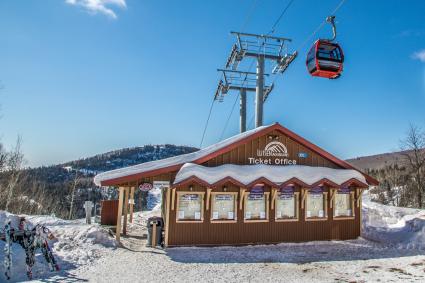Interest in proposed ski hill expansion could lead to extended public comment period
Earlier this week, the U.S. Forest Service and officials from Superior National Forest hosted a virtual open house that could be one of the final steps toward a decision on whether or not to allow the Lutsen Mountains Ski Area to expand ski runs and operations onto nearly 500 acres of adjacent U.S. Forest Service lands.
The meeting lasted more than two hours, including a question and answer period at the end of the slideshow and presentation. Most of the concerns or questions from the public focused on the impact an expansion of the local ski hill would have on the environment. Topics addressed ranged from climate change to light pollution, for example. Other concerns have been expressed about housing for employees at the ski hill to the impact of more traffic on Highway 61.
WTIP spoke Oct. 7 with Tofte District Ranger Ellen Bogardus-Szymaniak about where these publicly expressed questions and concerns fit into the decision making process for Forest Supervisor Connie Cummins. Ultimately, it is Cummins who will sign off on the document to approve or deny the special use permit from Lutsen Mountains that would allow the ski hill to expand. Audio to the Oct. 7 interview with the Tofte district ranger is shared below.
During the update, which aired live on WTIP’s Daybreak program, the Tofte ranger said an abundance of feedback from the community is likely to lead to an extension of the public comment period for the environmental impact statement regarding the ski hill expansion. An extension of the public comment period, currently set to expire Oct. 25, will be shared by WTIP if and when it becomes official.
Meanwhile, one term referenced frequently during the recent virtual town hall about the proposed expansion of Lutsen Mountains was the federal government’s National Environmental Policy Act, commonly referred to as NEPA. The federal review process is making headlines across the nation this week following the latest reversal of a Trump-era environmental rollback, the Associated Press reports. President Joe Biden is restoring federal regulations guiding environmental reviews of major infrastructure projects such as highways and pipelines. The reviews were scaled back by the Trump administration in a bid to fast-track the projects.
The White House Council on Environmental Quality said Wednesday it will restore key provisions of the National Environmental Policy Act, a bedrock environmental law designed to ensure community safeguards during environmental reviews for a wide range of federal projects and decisions.
Former President Donald Trump overhauled the rules last year in a bid to accelerate projects he said would boost the economy and provide jobs.
Trump made slashing government regulations a hallmark of his presidency. He and his administration frequently expressed frustration at rules they said unnecessarily slowed approval for interstate oil and gas pipelines and other big projects. The rule change imposed last year restricted the timelines for environmental reviews and public comment and allowed federal officials to disregard a project’s role in cumulative effects, such as climate change.
The 2020 changes caused implementation challenges for federal agencies and “sowed confusion among stakeholders and the general public,” the White House said in a statement.
The changes proposed Wednesday will restore regulatory certainty and “help ensure that American infrastructure gets built right the first time and delivers real benefits — not harms — to people who live nearby,” Council on Environmental Quality Chair Brenda Mallory said.
Contrary to assertions by the Trump administration, Mallory and other White House officials said, the new rule will actually speed up completion of major projects, since a rigorous review is more likely to withstand a legal challenge by environmental groups or states. Many Trump-era environmental decisions were reversed or delayed by courts after findings they did not undergo sufficient analysis.
Environmental groups and African American, Latino and tribal activists had protested the Trump-era rule change, saying it would worsen pollution in areas already reeling from oil refineries, chemical plants and other hazardous sites. The 1970 environmental law, known as NEPA, is credited with giving poorer communities a platform to negotiate with government regulators and big industries over major projects.
The Associated Press contributed to this report.














